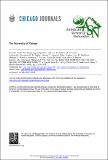Genetic tools for studying adaptation and the evolution of behavior
Abstract
The rapid expansion of genomic and molecular genetic techniques in model organisms, and the application of these techniques to organisms that are less well studied genetically, make it possible to understand the genetic control of many behavioral phenotypes. However, many behavioral ecologists are uncertain about the value of including a genetic component in their studies. In this article, we review how genetic analyses of behavior are central to topics ranging from understanding past selection and predicting future evolution to explaining the neural and hormonal control of behavior. Furthermore, we review both new and old techniques for studying evolutionary behavior genetics and highlight how the choice of approach depends on both the question and the organism. Topics discussed include genetic architecture, detecting the past history of selection, and genotype-by-environment interactions. We show how these questions are being addressed with techniques including statistical genetics, QTL analyses, transgenic analyses, and microarrays. Many of the techniques were first applied to the behavior of genetic model organisms such as laboratory mice and flies. Two recent developments serve to expand the relevance of such studies to behavioral ecology. The first is to use model organisms for studies of the genetic basis of evolutionarily relevant behavior and the second is to apply methods developed in model genetic systems to species that have not previously been examined genetically. These conceptual advances, along with the rapid diversification of genetic tools and the recognition of widespread genetic homology, suggest a bright outlook for evolutionary genetic studies. This review provides access to tools through references to the recent literature and shows the great promise for evolutionary behavioral genetics.
Citation
Boake , C R B , Arnold , S J , Breden , F , Meffert , L M , Ritchie , M G , Taylor , B J , Wolf , J B & Moore , A J 2002 , ' Genetic tools for studying adaptation and the evolution of behavior ' , American Naturalist , vol. 160 , pp. S143-S159 . https://doi.org/10.1086/342902
Publication
American Naturalist
Status
Peer reviewed
ISSN
1537-5323Type
Journal item
Description
C.R.B.B. acknowledges support from the National Science Foundation (NSF; grants IBN‐0086955 and IBN‐0120394), which funded the workshops and symposium that produced this article. A.J.M. and M.G.R. receive funding from the Natural Environment Research Council; S.J.A., L.M.M., A.J.M., and J.B.W. are supported by the NSF; F.B. is funded by the Natural Sciences and Engineering Research Council; and B.J.T. acknowledges support from the National Institute of Health.Collections
Items in the St Andrews Research Repository are protected by copyright, with all rights reserved, unless otherwise indicated.

